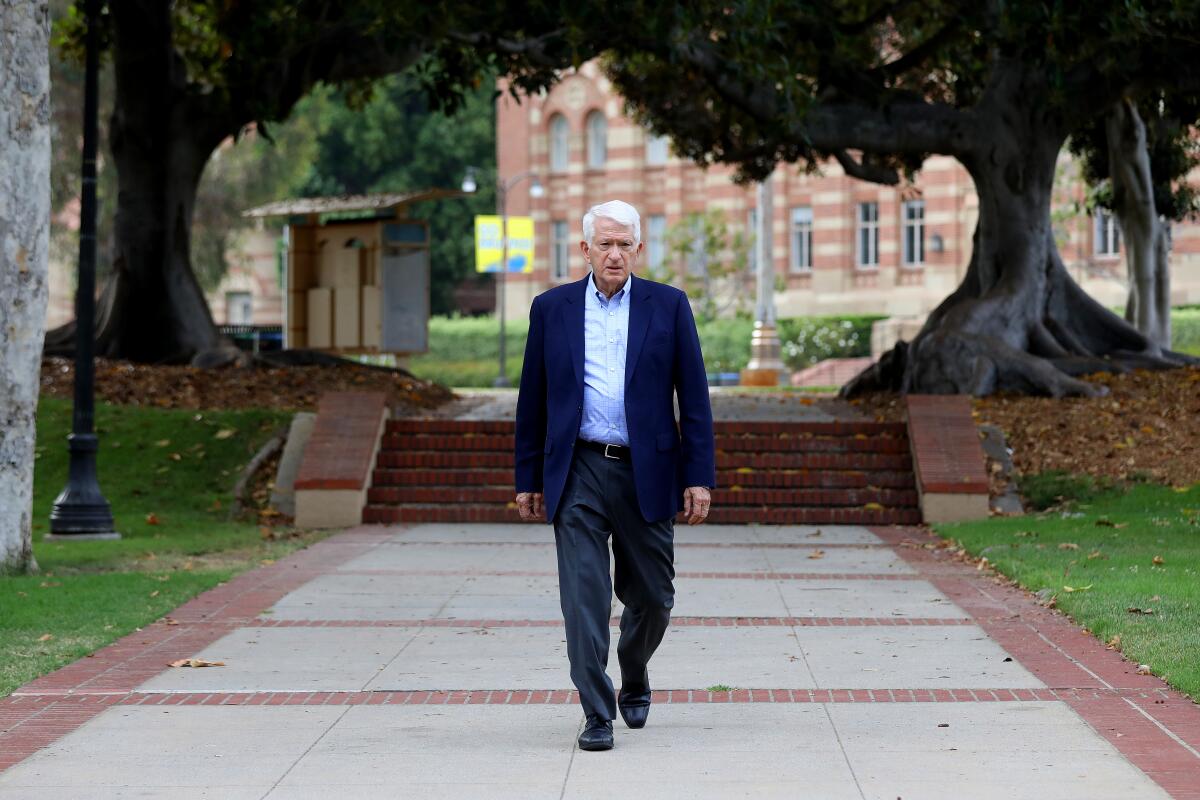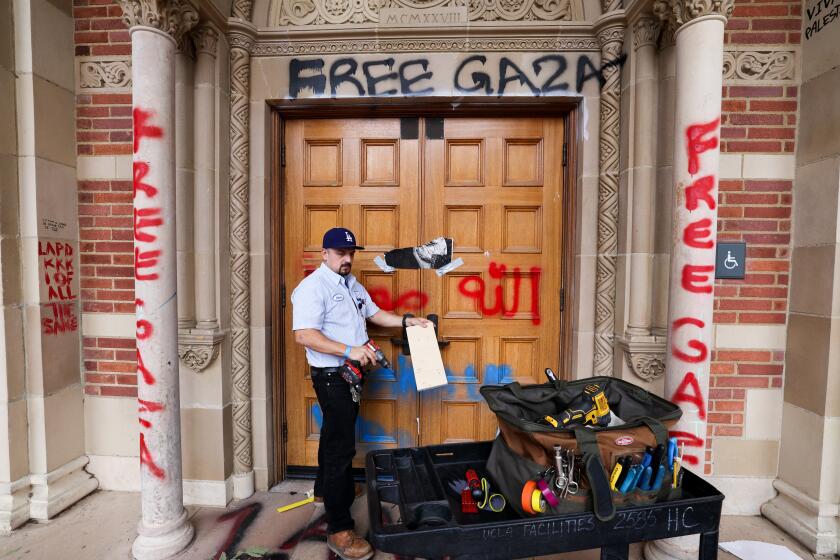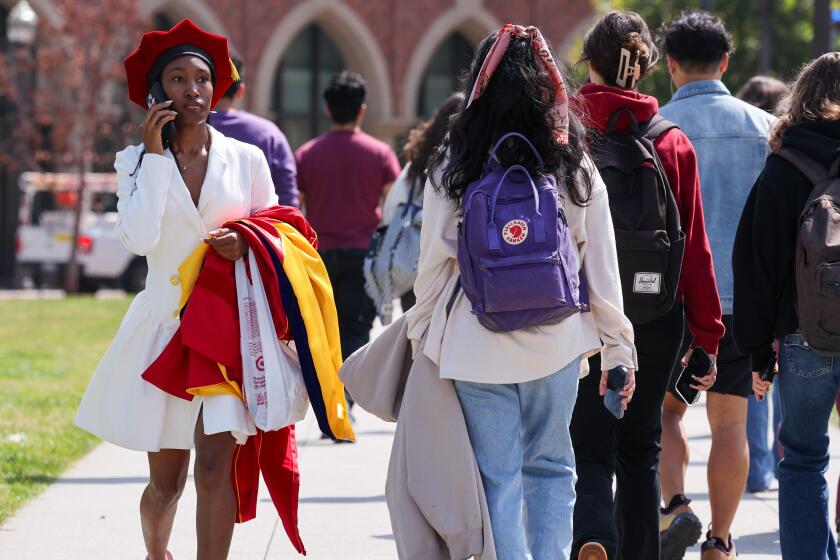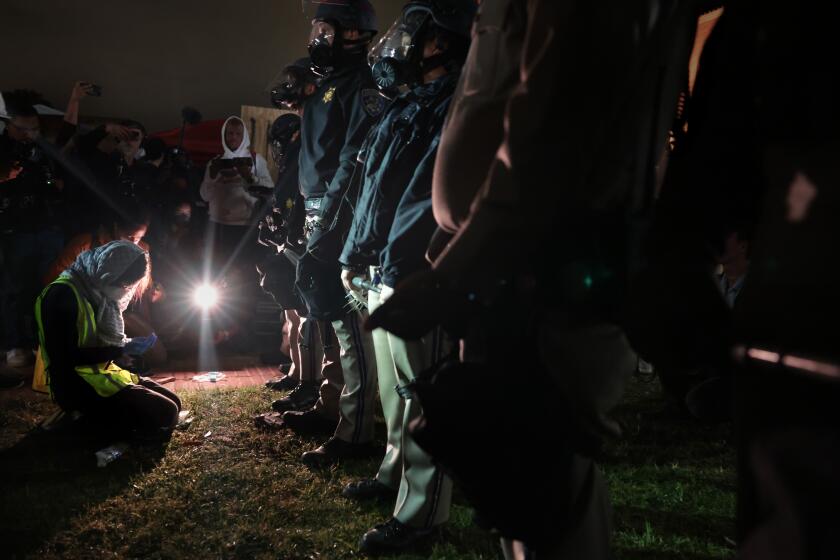UCLA Academic Senate rejects censure and ‘no confidence’ vote on Chancellor Gene Block

Representatives of the UCLA Academic Senate have voted against censuring and making a “no confidence” statement against UCLA Chancellor Gene Block, rejecting a call to issue a formal disapproval of his leadership amid criticism over the university’s response to a pro-Palestinian campus encampment and violent mob attack against it more than two weeks ago.
On a “no confidence” resolution, 79 faculty members approved, 103 opposed, five abstained, and seven members were present but did not vote, with 43% of representatives voting against UCLA’s top leader.
On censure, 88 faculty members approved, 88 opposed, three abstained and 15 were present but did not vote. Since the vote was split in half for and against censure, it did not pass as it needed a majority to succeed.
A congressional education committee is calling on the school to turn over documents regarding an ‘inadequate response to antisemitism’ amid violent clashes on campus.
Block declined to comment on the vote.
In a Friday letter to faculty, academic senate Chair Andrea M. Kasko said it was “clear that we are not united in how we view the major events of the past weeks and the campus response to them.” Kasko, a professor of bioengineering, said she hoped that “we can try to find common ground as colleagues and have the courage to listen with open minds and open hearts even when we do not agree.”
Following the vote, UC President Michael V. Drake said: “These are extraordinarily complex and unprecedented times for American universities. I appreciate Chancellor Block’s dedication and commitment to the University during these difficult times. We will continue to provide our chancellors with the support and resources they need to respond to these ever-evolving situations.”
The decision by the academic senate, even if the motions passed, would have been a largely symbolic vote with no legal authority over Block’s position.
Both votes focused on whether Block “failed to ensure the safety of our students and grievously mishandled the events” related to the pro-Palestinian encampment at the university that began April 25.
On April 30, a mob attacked the encampment overnight amid a delayed police response, leading to multiple injuries. Police later moved in to take down the encampment, arresting more than 200 protesters. The no-confidence and censure motions used the same language.
The vote was conducted by a legislative assembly of more than 200 members across UCLA departments who are elected to represent 3,800 tenured and tenure-track faculty.
It marked another somber moment for the leader of the nation’s top public research university. Block is ending his 17-year tenure in controversy after years of praise for steering the campus through a financial crisis and global pandemic by expanding enrollment, diversity, philanthropy and research funding. Block, a biologist, announced last year that he will step down on July 31 to return to research.
“This shows that many faculty support Chancellor Block and they understand that he was adhering to UC policy,” said a source who was not authorized to speak publicly. “People are realizing that Chancellor Block was put in an impossible situation.”
Faculty opinions reflected the divided vote.
Jeffrey Maloy, an associate professor of teaching in molecular cell and developmental biology, voted no on both motions.
“We support an investigation, but it didn’t feel there was a sincere effort to gather information and do some soul-searching, find out what the policies are, and whether they were violated,“ Maloy said. “It felt like an attempt to find a scapegoat.”
Maloy said he felt the censure resolution was unclear: Was Block’s behavior scrutinized for censure because the chancellor would not meet protester demands? Was it that he did not call police quickly enough the night of the mob attack? Or was it that he should not have called in police at all?
“I may have been persuaded to vote on a specific action tied to a specific thing, but this felt incredibly vague and aligned with faculty who wanted to claim an ideological victory,” Maloy said.
Michael Chwe, a political science professor and legislative assembly member who was among a group leading the push for censure and no confidence, said he still viewed the votes as “an achievement.”
“There were 50% of our faculty from all over the university, including the medical school and dental school, [who] were in support of censure,” said Chwe, who helped organize a letter signed by more than 900 faculty and staff members from across the University of California system that called for Block’s resignation. The letter also asked for amnesty for students, staff and faculty who participated in the encampment and peaceful protests, the university’s disclosure of all investments and its divestment from military weapon production companies.
The vote followed a nearly three-hour meeting Wednesday in which USC’s faculty members criticized the decisions of President Folt and provost Andrew Guzman.
“We obviously would like to have had more support,” said Chwe. “This is the start of many things people are doing to bring accountability and to protect student safety on campus.”
Chwe said those efforts included faculty support of a strike by United Auto Workers 4811, an academic workers union that includes graduate students, that is scheduled to begin Monday at UC Santa Cruz.
Renee Tajima, a professor of Asian American studies and a legislative assembly member, said the vote for censure and no confidence was a “no-brainer.”
“Who was in charge as our students were being beaten and injured as nobody from the university administration did anything to help them?” said Tajima. “To imagine students were brutally attacked and then the next day Block calls this huge police force to arrest them and use rubber bullets on them. ... This vote is the least we can do as faculty to make a statement of what’s right and what’s wrong.”
The senate’s decision takes one issue off a list of mounting challenges the chancellor faces in his last six weeks on the job.
In a Wednesday letter, Rep. Virginia Foxx (R-N.C.), chair of the House Committee on Education and the Workforce, requested that Block, Drake and Rich Leib, chair of the UC Board of Regents, produce all documents, communications and security videos related to alleged antisemitic events at UCLA since the Oct. 7 Hamas attack on Israel on Oct. 7.
The committee gave a May 21 deadline, two days ahead of a Washington, D.C., hearing in which Block and his counterparts from Rutgers and Northwestern will testify on antisemitism at college campuses — the next in a series of congressional hearings that have featured the presidents of Harvard University, the University of Pennsylvania and Columbia University, and the superintendent of Berkeley public schools.
The vote regarding Block’s leadership is the latest of several actions by U.S. university faculty over how administrations have dealt with pro-Palestinian protests.
On May 8, the USC Academic Senate voted to censure President Carol Folt and Provost Andrew Guzman over “widespread dissatisfaction and concern among the faculty about administrative actions and decisions” related to the cancellation of a pro-Palestinian student’s valedictorian speech and riot police clearing a campus encampment.
Many on campus and outside UCLA are criticizing the university for not handling the violent counterprotest better.
On Thursday, 61% of faculty members in the Columbia University School of Arts and Sciences voted “no confidence” in President Minouche Shafik, who is under fire for decisions to send in police to arrest campus protesters last month, including students who occupied a university building.
Three weeks of turmoil at UCLA started April 25, when students set up an encampment in the campus’ grassy quad to express solidarity with Palestinians, condemn Israel’s actions in Gaza and demand that UCLA divest from firms that make and deliver weapons and services to Israel. The encampment was initially free of violence, with protesters engaged in teach-ins, art builds, yoga and other activities.
UCLA declared the encampment unlawful on April 30. Later that night, a violent mob attacked the encampment and students were left to fend for themselves against beatings, pepper spray and fireworks for three hours. Law enforcement in riot gear moved in during the early morning of May 1, but it took hours to quell the violence.
Since then, a number of people have been blamed for the debacle. Internal and external investigations are underway.
More to Read
Sign up for Essential California
The most important California stories and recommendations in your inbox every morning.
You may occasionally receive promotional content from the Los Angeles Times.















